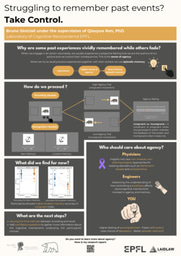Investigating the Relationship Between Episodic Memory and Sense of Agency
Struggling to remember past events? Take control.
This research report offers valuable insights into human consciousness, focusing specifically on the relationship between the sense of agency and episodic memory.
Abstract:
Struggling to remember past events? Take control and feel agency. This research examines how the sense of agency, the feeling of controlling one’s actions and their effects, relates to episodic memory, the ability to recall personal experiences in detail. My role was to implement an online experimental application to test this. While factors like sensory richness are known to influence memory, the role of the sense of agency remains unclear.
We hypothesise that greater agency strengthens the link between actions and bodily self-consciousness, the sense of being the agent of perception and movement. If an event is self-caused, one has a stronger feeling that the action “belongs” to oneself. This makes events feel more self-relevant and therefore more memorable. An associated sense of agency, which essentially offers additional information, may add a potential cue for retrieval for stimuli that have this.
In the first part of the experiment, participants are asked to move objects using a keyboard. Sometimes the object movements match the participant’s input, and sometimes they do not. After each trial, the participant is asked to rate the feeling of agency they have over the object’s movement. Later, they are asked to recall whether they saw the image before and its final direction.
The online version made the experiment accessible to a wider range of participants. I contributed to the experimental protocol by adding confidence questions after each recognition trial. Previous research in my laboratory found an effect on memory for object position, but not for the objects themselves. Confidence questions may help capture other aspects of this difference. Although data collection with this feature is ongoing, we expect higher agency may also influence object recognition.
Such findings would advance our understanding of self-consciousness and pave the way for non-invasive treatments for conditions like Alzheimer’s and schizophrenia that imply memory and agency deficits.

Please sign in
If you are a registered user on Laidlaw Scholars Network, please sign in